What were the best metal releases of 2011?
(See the followup article here: Best Metal of 2011.)
35 CommentsWhat were the best metal releases of 2011?
(See the followup article here: Best Metal of 2011.)
35 Comments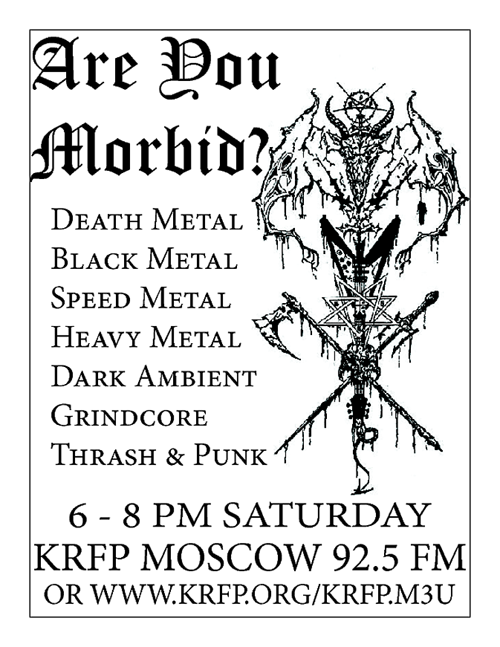 From 1995 to about 1999, the old underground tried to live on in a new modern form. Then it collapsed, and what took over was an indie/alt-rock hybrid of metal that lost the raw aggressive spirit of metal and replaced it with self-pity. Starting in 2006 or so, the revival of the underground began. A new radio show is helping blast that door wide open with a solid diet of underground death metal, black metal, grindcore, speed metal, thrash (crossover), and hardcore mixed in with dark ambient and possibly classical music. Meet Devolved, the voice and choice of music behind the show.
From 1995 to about 1999, the old underground tried to live on in a new modern form. Then it collapsed, and what took over was an indie/alt-rock hybrid of metal that lost the raw aggressive spirit of metal and replaced it with self-pity. Starting in 2006 or so, the revival of the underground began. A new radio show is helping blast that door wide open with a solid diet of underground death metal, black metal, grindcore, speed metal, thrash (crossover), and hardcore mixed in with dark ambient and possibly classical music. Meet Devolved, the voice and choice of music behind the show.
What name do you use on the air?
Devolved. Devolution is real!
Why did you pick an old school death metal, black metal, thrash, grindcore, speed metal, heavy metal and dark ambient show?
Metal helped me see the world in a new light, or at least provided a soundtrack. Perhaps it will affect a few of the listeners in the same way. My generation (what they call the ‘Y’ generation) certainly needs a new light and a new path.
Do you think these genres offer something artistically or politically that doesn’t exist anywhere else?
I can’t say that with certainty. But the best metal does contain a spirit which is hard to find elsewhere. A real love of life, and of death. And that youthful desire to analyze all aspects of reality, even if unpleasant.
What’s a typical playlist?
Mostly death metal with forays into other genres. Autopsy, Suffocation, Massacra, Immortal, and Slayer are perennials. I discover more metal music all the time, both modern and old-school, and incorporate what I find stimulating.
How has response been so far?
A few locals have called in and voiced their support. People also listen to the show online; how many is hard to know.
Do you think there’s a difference between old school underground metal and what’s going on now? If so, what is that difference?
Obviously, but I really don’t know much about the modern ‘scene’. It seems that most of the good releases of the past few years have been composed by musicians who have been around since the formative years. It’s possible that people of my generation are simply incapable of creating quality metal, either for innate reasons or because attention is focused elsewhere.
What defines an underground genre, like old school death metal?
Shared ideals through a shared artistic method. The “underground” aspect is probably a conscious choice to avoid decay and assimilation.
Why do you think there was such a peak in output of old school death metal and black metal in the late 80s through early 1990s?
Seems like intelligent, alienated Westerners finally realized that the rot had reached to the very core of our society, and that by that point halting Kali was impossible. Certain individuals had realized this long before, but it takes a critical mass of aware people for an artistic movement to form around such an idea.
Is something similar going to happen again?
That would be cool. What I see with my generation these days is that they’re either totally lost in their own narcissism, or are working their butts off to rise above the masses of this overpopulated planet. That doesn’t leave much time for art.
What advice would you give someone interested in learning about these genres?
Find people you respect and see what they say influenced them (this is why band interviews are great). Death Metal Underground and DLA both introduced me to a lot of good stuff; frankly I often just trawl through Youtube vids until I find something interesting. Learn more about the craft and composition and don’t be afraid to be critical, selective or ‘elitist’.
I was watching the Combat Records Live at Studio 254, NY tape with Venom, Slayer and Exodus. Slayer were getting loaded and talking about how they liked Bach and Tchaikovsky. When I interviewed Quorthon, he was heavily into Bach as well. Do you think there’s a connection between metal and classical?
Absolutely! The simple explanation is that classical (and baroque) music will deeply affect anyone with intelligence and taste and love of art, or even one of those three qualities. Metal bands were not the only musicians affected, but they incorporated these influences into their own compositions in a way that no one else did.
No CommentsInteresting source:
Industrialization and modernization have had a drastic effect on the Western world. The combined effects of urbanization, commercial consumerism, modern science, and a host of other factors have “left us cold, alone and naked in an uncaring universe. It has stripped us of our ability to commune with the transpersonal, robbed us of our freedom to choose, and forbidden us to look inside our own minds for any kind of release (Schroll 2005:60).” Compartmentalization of the aspects of one’s life in modern society furthers a sense of incongruity and separateness. Professional life is often separate from family life; social life is often separate from religious or community activities. The multicultural and ever globalizing nature of the modern world creates its own difficulties. And strong sense of culture and community are rarely based on geographic location, but more often around a sense of one’s history and the beliefs, ideas, habits, morals, and aesthetics it affords. Thus, to find a sense of commonality one must often leave the neighborhood in order to gather with like-minded people. – Dave’s Metal Blog
He goes on to explain how heavy metal forms an ad hoc culture/religion/values system in the above vacuum. Good stuff.
No CommentsTags: culture, Heavy Metal, Religion
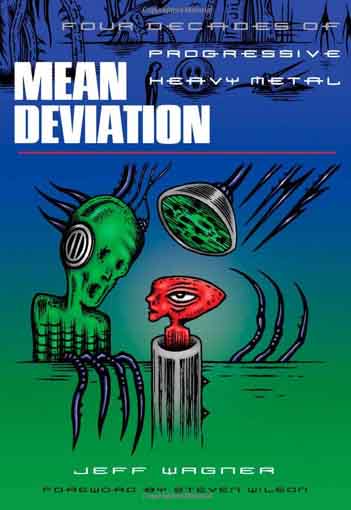 Human progress will forever be linked to those most primal memories of our species, wherein there emerged that intrepid curiosity that formed the crux on which history could be built. Moreso than the will to merely survive and subsist, it was the will to forsake the paradise of safety and pursue instead the harsh, untamed dusklands of the unknown, where intense tribulation could reveal the fiercest potentials of the few that could overcome. Within the realm of music — that most iconically Romantic of arts — this sentiment persists as a striving to expand the capacities of willful expression into an all-encompassing whole, swelling into symphonic full bloom during the 19th Century. But now, in the dreary modernity that constitutes post-World War II planet Earth, Metal music has proven to be an improbable successor to this upward-climbing composing ethos, and its 40-year history itself resembles less some linear development than it does the genealogy of a warrior race: evolving as one from troglodytic Rock origins, but then splintering into variegate subdivisions as established kingdoms become ever stiflingly overpopulated. If it is those most radical of subdivisions commanded by wildcat eccentrics, hermitic technicians, and sadistic savants that best define the nebulous label that is “progressive metal”, then ‘Mean Deviation‘ — the new and exotic pet project of Metal Maniacs veteran Jeff Wagner — is the one book ambitious enough to fasten a historical yoke around such a chaotically polymorphous Metal strain.
Human progress will forever be linked to those most primal memories of our species, wherein there emerged that intrepid curiosity that formed the crux on which history could be built. Moreso than the will to merely survive and subsist, it was the will to forsake the paradise of safety and pursue instead the harsh, untamed dusklands of the unknown, where intense tribulation could reveal the fiercest potentials of the few that could overcome. Within the realm of music — that most iconically Romantic of arts — this sentiment persists as a striving to expand the capacities of willful expression into an all-encompassing whole, swelling into symphonic full bloom during the 19th Century. But now, in the dreary modernity that constitutes post-World War II planet Earth, Metal music has proven to be an improbable successor to this upward-climbing composing ethos, and its 40-year history itself resembles less some linear development than it does the genealogy of a warrior race: evolving as one from troglodytic Rock origins, but then splintering into variegate subdivisions as established kingdoms become ever stiflingly overpopulated. If it is those most radical of subdivisions commanded by wildcat eccentrics, hermitic technicians, and sadistic savants that best define the nebulous label that is “progressive metal”, then ‘Mean Deviation‘ — the new and exotic pet project of Metal Maniacs veteran Jeff Wagner — is the one book ambitious enough to fasten a historical yoke around such a chaotically polymorphous Metal strain.
It’s a ridiculously exacting task to try and chronicle the entirety of a musical subgenre that isn’t really a subgenre, and whose content cannot be readily identified by formal analysis alone. And yet Wagner, being the dauntless historian that he is, enters the Nocturnus Time Machine® with naught but the earnest objective of highlighting whichever works were exceptionally bizarre, brainy, or both. Placing his starting coordinates in the late 1960′s when progressive rock and early ambient music had already begun to explore more neoclassical avenues, Wagner narrates the concomitant emergence of heavy metal, and oversees its unprecedentedly rapid appropriation of prog complexities. The most non-canonical, wildly erratic career choices of Black Sabbath, King Crimson, and especially Rush receive extensive coverage, and upon this foundation of classic radio giants, Wagner uncovers many of the grandiose intellectual motivations that would plant the seeds of ambition in the burgeoning ’80s underground — an explosive era that Wagner veritably lived and breathed throughout.
From this point is of course where the bulk of the book begins and where divergent paths are most numerous and dramatic, starting with an initial divide between what is now commonly known as Progressive Metal proper — Fates Warning, Queensrÿche, Crimson Glory, and [must we mention them?] Dream Theater as examples — and the more abrasively progressive styles that were set in motion by speed metal aberrants Watchtower, Voivod, Celtic Frost, Coroner, and a small conglomerate of other leaders whose names consistently haunt the chapters further on. The subsequent outgrowth of extreme metal within the following decade then takes the spotlight for what seems like a third of the book, and the magnitude of its proliferation logically finds Wagner having to document deviance on a steady, region-by-region basis. But in this manner, he is as remarkably thorough in his examinations of familiar prog-extremists as he is with some of the more impossibly obscure names, reliably identifying which recordings showed noteworthy marks of ingenuity. A study of Finland, for instance, seizes Demilich by the tentacles and takes special interest in Beherit‘s darkwave transmogrification. Norway’s chapter highlights Mayhem‘s early adoration of Swedish prog band Änglagård and of course German synthpop and kosmische musik, and goes on to investigate the growth of Manes, Burzum, Enslaved, and Neptune Towers. Continental Europe reveals a constellation of luminaries ranging from Supuration to Atrocity, whilst the melting pot frontiers of the Americas yield regional anomalies as diverse as Gorguts and Obliveon up in Québec to Atheist and Hellwitch down in Florida. And, wherever possible, Wagner takes great efforts to cite any intellectual influences or achievements on the bands’ parts; tellingly, Classical and ambient music is a frequent subject here, as are academic degrees in a surprising array of fields.

It is surely impossible to write a “progressive metal” book that will be accepted in all circles of the culture, as controversy and even widespread disapprobation seem to be taken for granted in the music itself. But for the particular minority who identify themselves as hessians, it is certain that many will lose interest as the final hundred pages close in, simply because almost all of the so-called cutting edge Metal bands of the late ’90s and onwards fail to contribute anything significant to the genre; but in Wagner’s defense, there are many instances where he does bring attention to the growing problem of entropy. The more philosophical among us may further object to the very grounds for Wagner’s criteria for “progressive-ness” — that is, how much the work in question defies convention and expectations. To build from an early example, Wagner argues that Voivod’s ‘Angel Rat‘ — an album widely lambasted as a sell-out for its regression to verse-chorus, consonant indie stylings — is in fact a progressive step for the band because it was so utterly unlike any of the albums that preceded, or anything else in the scene at the time. But this is nothing if not the most prostrate kind of optimism, which accepts an undesirable antithesis — in this case, total artistic decline into meaninglessness — as a necessary part of a dubious process towards some ideal of absolute artistic freedom or whatever. It’s true that to speak of “progress” we need to postulate an objective or end of some sort to move towards, but externalities like novelty and individuality alone are insufficient; something more intrinsic to Metal’s being must be identified, otherwise you allow for a flood of the same self-obsessed, irrelevant music-as-product to garner the association simply because it’s clever enough to imitate the distorted aesthetic. Therefore it is best to assert as an axiom that for the subject to be Metal, it must have as its essence that visceral if rather elusive-to-define spirit of vir, whose amorally creative will to power is partially outlined in the introduction to this review. From here, determining progression in Metal is only a contextual (and decidedly more limited) matter of whether the subject meaningfully transmits its central motivation using methods previously unexplored, for any number of nuanced reasons ranging from technical breakthroughs to conceptual maturation to ingenious angles of arrangement; of course, the ironic consequence to progressive forms is that they are often seized upon by the majority and ossified into standard forms over time. So, based on these tenets, you would have to re-evaluate progressive-labelled, impostor Metal bands like Opeth as actually not effectively progressive as a band like Morbid Angel, who were significant not only for innovative technique, but for using their talents towards representing death metal philosophy with hitherto unheard-of imagination and perspicuity. Take this same critical hammer to the “progressive eras” of Enslaved, Amorphis, Death, and all related corrupted prodigies who allowed themselves to be domesticated into entertainers, and suddenly ‘Mean Deviation’ is chiseled down from a bloated tome to a slim pamphlet.
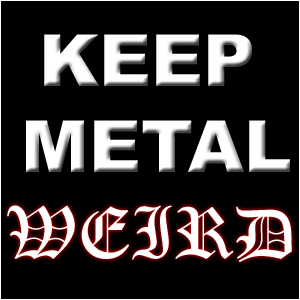 Now it’s apparent that ‘Mean Deviation’ surely has its points of contention, but then again the book’s stated aim isn’t to illustrate a concrete and ontologically-sound definition of what progressive metal is, nor is it out to namedrop every single band that may have garnered the label through whatever happenstances of popular delusion. Essentially, the book’s aim really is as simple as what its title conveys: to reevaluate the Metal timeline with a specific interest in whatever was outstandingly highbrow and/or shunned by the hypothetical average headbanger. It is a scholarly, well-referenced, yet personable inquiry of metallurgical innovation, which harbors aspirations towards objectivity and acceptance amongst society’s intellectual elite, but never mistakenly reduces the art to a mere science. Rest assured that trivia in abundance is here to tantalize the reader’s inner nerd; just remember to take it all in with a sizable grain of sodium chloride.
Now it’s apparent that ‘Mean Deviation’ surely has its points of contention, but then again the book’s stated aim isn’t to illustrate a concrete and ontologically-sound definition of what progressive metal is, nor is it out to namedrop every single band that may have garnered the label through whatever happenstances of popular delusion. Essentially, the book’s aim really is as simple as what its title conveys: to reevaluate the Metal timeline with a specific interest in whatever was outstandingly highbrow and/or shunned by the hypothetical average headbanger. It is a scholarly, well-referenced, yet personable inquiry of metallurgical innovation, which harbors aspirations towards objectivity and acceptance amongst society’s intellectual elite, but never mistakenly reduces the art to a mere science. Rest assured that trivia in abundance is here to tantalize the reader’s inner nerd; just remember to take it all in with a sizable grain of sodium chloride.
Written by Thanatotron
1 CommentTags: zine-books

Tags: dark legions archive, death metal, death metal underground, heavy metal site, LARM, site map, spinoza ray prozak
Gontyna Kry – Welowie
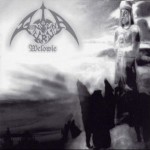
One of the best works of Polish black metal, Welowie has the craftmanship and melodic sophistication of Sacramentum’s best work but marginalizes the death metal influences, instead filling that loophole with the post-Discharge melodic hardcore that Graveland had a niche for carving out in their earlier work. Distant screams amidst a melancholic plethora of notational sequences reveal a sense of emotionally fraught catharsis not unlike a more musically ‘learned’ take on Mutiilation’s best works. The eight tracks on here run at just over 26 minutes in total but still in such a limited constraint manages to make the most of epic scope and artful expression within a time constraint that would more traditionally fit a death metal band. In some ways calling this work merely a ‘demo’ does it little justice. –Pearson
War Master – Chapel of the Apocalypse
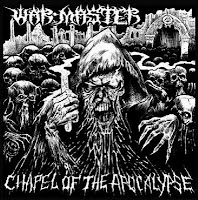
A young Texan war squad shows you don’t need advanced technique or labyrinthine compositions in order to succeed at pulverizing death metal hostility, as the palm muted chainsaw grind slugs onwards with the determination of a German panzer advancing towards certain death upon the Stalingrad plains. As with most young death metal bands, their earnestness sets them apart from most of the older colleagues and the primitive, architectural weight of “Awaken in Darkness” convinces one of morbid intentions unlike a thousand Necrophagists. Dark atmospherics abound in these documents of fear and rage in chthonic shade, bringing reminders of Amorphis’ and Incantation’s early Relapse days , the five musicians being able to build a solid tribute to their influences on this demo and generate a fiendish excitement for a capable followup. The success of the band in creating an esoteric sensation out of their simple source material is worthy of praise. –Devamitra
Witchblood – Witchblood
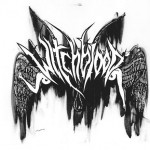
As if possessed by the ritual thrall of Walpurgis night, this mostly solitary creation of an individual called Iron Meggido is a clash of smoothly feline aggression of Nordic Black Metal with the Romantic architectural use of Heavy Metal riffs that characterized the occult metal of Celtic Frost, Samael and Therion. Alongside the suggestive and provocative riff stand the invoking voice of an Erinys caustically timed with the bludgeoning tempi of guest drummer L’Hiver. Underlying the beauty of this demo is the illuminated fire of an artistic vision in its birth-throes, painfully struggling against the bounds of convention in order to express the ultimately inexpressible: the twilight zone of fever and mythos where the ‘supernatural’ influences the evolution of man and mind. Hopefully their talisman is effective in order for the legion of Witchblood to fly even higher on these wings of rapture.
–Devamitra
No CommentsTags: Black Metal, death metal, Mythology, Occultism, War Metal
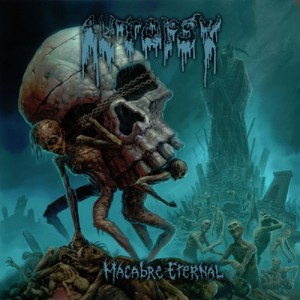
The last couple of years have seen a artistic renaissance of a genre that throughout the best part of the mid- to late 90′s, and the early reaches of the millennium, was perceived to be a ghost that had long outlived it’s most glorious moments of artistic clarity. Great quantities of ‘gore’ and ‘brutal’ Death Metal acts have over the last two decades, dumbed down the mystical perversity that gave a genre the likes of Blessed Are The Sick, Legion, Cause Of Death, Onward To Golgotha, Imperial Doom, has in years past given way to acts that aim principally for shock value, sidetracking any of the compositional and dynamic attributes that were the essence of what made Death Metal so vital in it’s 1989-1993 heyday.
It’s great that Autopsy should record such a gem as this, as it serves to vanquish the plasticity and dross that once great acts such as Morbid Angel and Deicide have spluttered forth. Not only does it filter out these negatives, but it also does great justice to many artists who embrace an archaic yet craftsmanlike and refreshing interpretation of Death Metal.
In addition to having put out the excellent ‘The Tomb Within‘ EP last year, Autopsy have eschewed the notion of ‘re-recordings’ or filtering previously released material onto this new record. Instead what we have is a colossal, quite lengthy record, lasting greater than an hour but never straying from momentum and vibrancy.
It wouldn’t be unfair to say that in terms of intricate song structuring, Autopsy have perhaps even upped on what they originally achieved on Severed Survival and Mental Funeral, with a more obvious sense of grandeur. This exhibits itself on tracks such as ‘Bridge Of Bones’ and ‘Sadistic Gratification’, which sound somewhat like a logical conclusion of what was being hinted at on their second album. Eric Cutler’s riffs and modes are the usual tritonal, Black Sabbath meets Hellhammer-esque death dirges, which occasionally recycle patterns and forms familiar in early material, yet also giving the album a renewed sense of consistency. It is this grasp of orthodoxy within the metal genre which always makes for contributing to the collective framework of the artists work, which Autopsy fulfill here.
This is however not to say that there are flourishes of ‘experimentation’. Luckily the band have played a good hand of cards, and have not fallen into the ludicrous corner of ‘evolving for the sake of it’. Particular songs on ‘Macabre Eternal’ show the band using greater song lengths than before (‘Sadistic Gratification’, ‘Sewn Into One’), and also display a greater sense of direct melodicism (‘Dirty Gore Whore’). Whilst Autopsy have never been associated with playing at fast speeds, large stretches of this album are more uptempo.
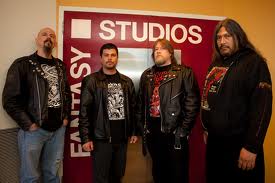 Chris Reifert is on top form as a vocalist. His ability to evoke majestic visions of dismemberment and perversion seem to contain a greater dynamic than usual, as to suggest that nearly fifteen years of prolonged absence has only allowed his strengths to re-accumulate.
Chris Reifert is on top form as a vocalist. His ability to evoke majestic visions of dismemberment and perversion seem to contain a greater dynamic than usual, as to suggest that nearly fifteen years of prolonged absence has only allowed his strengths to re-accumulate.
Though certainly not a complaint on behalf of the reviewer, what may potentially put off some fans of earlier material is the production, which is undeniably modern in tone. Whilst Chris Reifert’s drumming is still top notch the only minor complaint being that the compression on his drumkit seems to somewhat nullify the sense of ability, flair and aggression that a more analogous production would bring out. Whilst Macabre Eternal possesses all of the right atmosphere and conviction worthy of great death metal, the more aesthetically orientated listener will notice that the overall tonality is not as analogous as what was committed to tape in the 80′s and 90′s.
In spite of this minor specific, this album is superb, and rightly deserves to be considered a beacon of the revivification of a dark and morbid art form that until the turn of the new millennium, was considered a dead horse. Hail the new dawn. Not only in terms of structural and grandiose perversion does this album triumph, but fragments of it’s lyrical scope only serve further as to compliment the metaphysical and transcendental nihilism that death metal eternally symbolizes.
“Under the sign of a skull faced moon
We rise from abysmal embryotic doom
Existence as torment, yet locked in a grave
A sick fragile cycle from which no one is saved”
Within the recent decade, this is the best ‘comeback’ release that has emerged from any of the elder practitioners of the genre. Undoubtedly, this shall also be a worthy contender for being the best album of the year.
-Pearson-
No CommentsTags: American Death Metal, death metal, Gore, Horror, Nihilism, Old School Death Metal
1. What is Death Metal?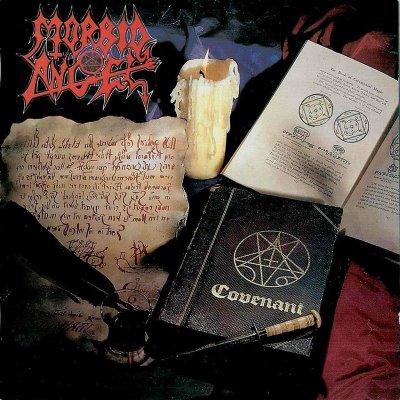
2. Who invented Death Metal and when?
3. Why do most Death Metal fans wear distinctive t-shirts?
4. How to understand Death Metal lyrics?
5. Why does Death Metal have such a morbid visual style?
6. Are Death Metal bands satanic or occultist?
7. Does Death Metal possess an ideology?
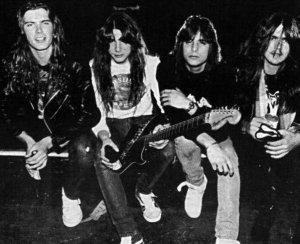 Death metal is structuralist heavy metal that borrows heavily from classical and industrial music. Its heritage is equal parts neoclassical heavy metal from the 1970s and hardcore punk from the early 1980s; if you throw Discharge, Judas Priest and King Crimson into a blender and set it on “high,” you might get something like death metal. It took from roughly 1983-1988 for death metal to fully evolve, and at that point, it experienced six golden years of fruitful growth before lapsing as black metal eclipsed it in popularity.
Death metal is structuralist heavy metal that borrows heavily from classical and industrial music. Its heritage is equal parts neoclassical heavy metal from the 1970s and hardcore punk from the early 1980s; if you throw Discharge, Judas Priest and King Crimson into a blender and set it on “high,” you might get something like death metal. It took from roughly 1983-1988 for death metal to fully evolve, and at that point, it experienced six golden years of fruitful growth before lapsing as black metal eclipsed it in popularity.
The original underground musical genre, death metal was completely unknown to most people until 1997 when it became fodder for mainstream commentary after several school shootings. During the 1980s and early 1990s, it was impossible to find death metal in normal record stores and chains; most people ordered it from small mailorder companies, or “distros,” that stocked underground metal exclusively. The underground in fact replicated every aspect of the normal music industry, including journalists and radio stations, to avoid being tainted by “commercial” or “mainstream” music.
We say death metal is “structuralist” because, in contrast to rock music, its goal is not a recursive rhythm riff that encourages constant intensity through verse-chorus structure; death metal, like black metal after it and prog rock and classical before it, uses “narrative” song structure, or a string of phrases connected in such a way that they effect musical and artistic change throughout the song. While rock music aims to find a sweet riff and ride it, and much of older heavy metal does the same, death metal is like opera: its goal is to use riffs to introduce more riffs, and through those, to create a treelike structure of motifs which resolve themselves to a final dominant theme. In this, death metal (like the progressive rock and synthpop bands that influenced it) is closer to classical music than rock music.
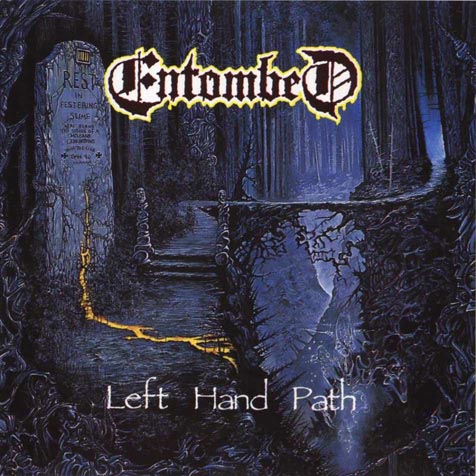 The history of rock music has been written by commercial promoters who have tried to establish its “authenticity” and uniqueness, and therefore, almost all mainstream publications are hostile to death metal. Death metal reminds us that rock music, blues and jazz did not arise autonomously in America, but were based on centuries of European popular music (the I-IV-V chord structure of the blues is derived from European folk music, and its “blues scale” is a modification of Asian and Celtic scales). Rock music is a scam, and its marketing makes it seem to be something greater than what it is, which is the same old music dressed up as a product. Death metal more than any genre before it broke from the rock tradition, and therefore is a threat to the rock establishment and its profits.
The history of rock music has been written by commercial promoters who have tried to establish its “authenticity” and uniqueness, and therefore, almost all mainstream publications are hostile to death metal. Death metal reminds us that rock music, blues and jazz did not arise autonomously in America, but were based on centuries of European popular music (the I-IV-V chord structure of the blues is derived from European folk music, and its “blues scale” is a modification of Asian and Celtic scales). Rock music is a scam, and its marketing makes it seem to be something greater than what it is, which is the same old music dressed up as a product. Death metal more than any genre before it broke from the rock tradition, and therefore is a threat to the rock establishment and its profits.
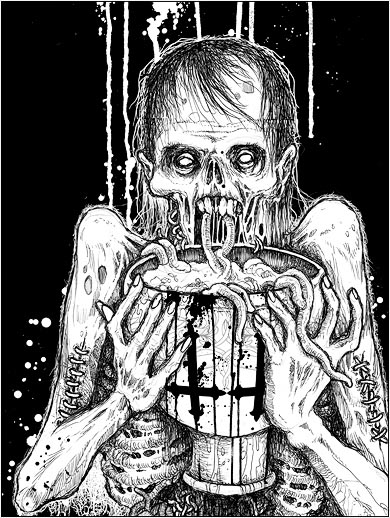 Like most musical genres in the modern time, death metal is constantly under assault not only from external interests, but from within, as self-interested people try to make rock music and dress it up as death metal. These attempts to simplify the genre would benefit those who attempt them, as they would both be able to make a saleable product (being similar to established musical tastes, it sells easily and broadly) and be able to claim the “authenticity” of belonging to an outsider form of art such as death metal. These false death metal bands have polluted the genre with the same mainstream dogma and musicality that death metal sought to escape. Like all human social breakdown, this breakdown occurs through the selfishness of individuals who are unwilling to admit that the health of the genre is more important than their personal profit.
Like most musical genres in the modern time, death metal is constantly under assault not only from external interests, but from within, as self-interested people try to make rock music and dress it up as death metal. These attempts to simplify the genre would benefit those who attempt them, as they would both be able to make a saleable product (being similar to established musical tastes, it sells easily and broadly) and be able to claim the “authenticity” of belonging to an outsider form of art such as death metal. These false death metal bands have polluted the genre with the same mainstream dogma and musicality that death metal sought to escape. Like all human social breakdown, this breakdown occurs through the selfishness of individuals who are unwilling to admit that the health of the genre is more important than their personal profit.
Death metal flourished from the mid-1980s to mid-1990s, and then was for most purposes replaced by black metal. Where death metal was structuralist with heavy emphasis on chromatic phrasing and hence rhythmic, black metal used narrative construction based on melody (an innovation of later and progressive death metal bands as well, such as At the Gates, Atheist, Gorguts and Demilich). As such, it is often hard to tell where death metal ended and black metal began, although in their mature form they are distinct genres. In this, and in the aesthetic components of death metal borrowed by mainstream bands as varied as Slipknot and Nirvana, death metal lives on.
References:
The History of Metal
Death metal arose from the end of hardcore punk colliding with a desire to renew the spirit of metal; launched in 1969, proto-metal like Black Sabbath had become lost among hard rock (Led Zeppelin) and progressive rock (King Crimson) and needed redefining. The aggressive, oversimplified, and disconnected from contemporary music sound of hardcore punk was apt and therefore infused into heavy metal. In the process, because hardcore punk relied on streams of power chords or phrasal instead of rhythmic competition, metal became an entirely new animal.
This change can be heard first in speed metal bands like Metallica, Slayer, DBC, Rigor Mortis and Nuclear Assault. Phrases got longer, songs got more intricate, and the type of riffing that repeated a rhythm using a single chord got rarer; a new form of music was in the forging. However, these bands were still too entrenched in many of the rock-influenced tendencies of metal; death metal made a clean break from these. (It is interesting to note that the ultimate point of breakaway was thrash, or hardcore punk crossover bands who wrote punkish songs with metal riffs; these reduced music so much to its essence that it had to reconstruct itself, and having grand ambitions, reached toward narrative composition instead of the hackneyed rock styles.)
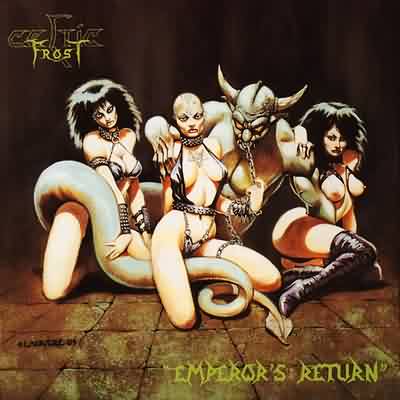 During the years 1983-1985, a style emerged that was between death metal, black metal and thrash, and from this all of the succeeding genres were to derive their musical inspiration. Bathory, Sodom, Hellhammer/Celtic Frost formed the basis of this style, augmented in the Americas by Possessed, Slayer and Sepultura. From these founding acts styles diversified into death and black metal. While many give credit to Venom for the term black metal, musically speaking they were rooted firmly in the heavy metal tradition.
During the years 1983-1985, a style emerged that was between death metal, black metal and thrash, and from this all of the succeeding genres were to derive their musical inspiration. Bathory, Sodom, Hellhammer/Celtic Frost formed the basis of this style, augmented in the Americas by Possessed, Slayer and Sepultura. From these founding acts styles diversified into death and black metal. While many give credit to Venom for the term black metal, musically speaking they were rooted firmly in the heavy metal tradition.
The golden years of death metal were from 1988 to 1994, during which time the classics of the genre and all of its variations formed. Percussive death metal thundered from the industrial east coast of America; Texas produced a harsh and grating otherworldly sound; Florida created the rhythmic and alienated Tampa style of death metal. Progressive bands from the USA and melodic bands from Sweden rounded out the style, as did innumerate hybrids, including doom metal and speed metal crossovers.
However, by 1994, the genre reached a decision point: where to go so as to keep up with black metal, which had expanded into melody as quickly as death metal had expanded into rhythmic structure, and now threatened to become more popular? The death metal genre had become calcified between diehards who insisted on a narrow definition of style, and “innovators” who wanted to make it into rock music, but both groups in their efforts to control external factors forgot internal factors, and the ideology and artistic spirit of death metal as lost. As such, it appeared senile and was forgotten for some years.
At the time of this writing, death metal is practiced by a few holdovers from the late 1980s who continue to put out quality music, but their numbers decline each year. The general health of the metal community is poor because it focuses on uniqueness of external appearance and not composition and artistic integrity. While we hold out hope for a death metal revival, it is more likely that it will simply take its place in history and we will be left with recordings.
References:
The History of Metal
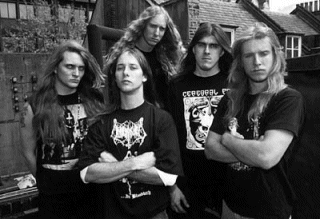
In the underground death metal subculture, the shirt you wear — bearing the logo of a favorite band or organization or concept — defines which strata of social accomplishment to which you belong within the death metal community. Your taste identifies your level within an intellectual hierarchy based on what its members are able to comprehend, or withstand, perhaps, musically.
For example, a guy in a Cannibal Corpse t-shirt might be neglected by someone wearing a Beherit t-shirt because Beherit has a more esoteric and theoretically-adventurous audience than the low-brow blockhead churning of Cannibal Corpse; t-shirts determine what bands your brain can accept and thus often, a type of caste identification within the hierarchy of fans. Those who try to forge this identity often find themselves answering difficult questions under unpleasant circumstances.
In the inverse situation, someone in an Atheist t-shirt might laugh off someone wearing a Sarcofago t-shirt as a philistine. This allows multiple communities to exist in a hierarchy within the death metal community and identify each other by sight, as well as differentiate metalheads from the hordes of drone normals who do nothing but buy Creed CDs and singing plastic fish.
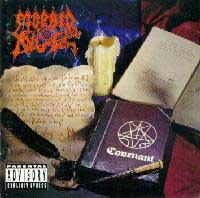
Death metal bands tend to use complex, Latinate language to describe the world in terms of its function and technologies, leaving the emotional terminology for rock music and blues. Its goal is not to affirm the emotions of the individual, but to point out the effects of structural change in the surrounding world. Not surprisingly, as a musical movement, death metal is also structuralist.
Unlike rock genres, there is a near total absence of gender words and love songs. Death metal is not about emotional escapism. Death metal is about reality.
Symbols serve as an important anchor between the way a music sounds and what it represents aesthetically, including the ideas of the musicians as inspirational to their work. In death metal, there are several main categories of symbolism: the “occult,” the morbid, and the technological.
Death metal art — as seen on tshirts, album covers, flyers, patches, pins and stickers — includes all of these. The occult represents an opposition to morality; as a “nihilistic” genre, death metal musicians tend to be realists and recognize that no matter how much we classify something as morally bad or good, reality is unaffected, and whatever object is in question will serve reality at the level of function and not morality. The morbid represents another nihilistic outlook, which is that not only is death more real than our moralizations against it, but it will inevitably happen to us and we must be reminded by that. Where the occult uses pentagrams, ancient script, sigils and demonic imagery, the morbid uses disease, horror, submission and bodily corruption (including the mind/body turned against itself, as in zombie films) as its palette.
Technology makes an odd bedfellow with death metal art, as it is commonly used to modify one of the other two categories. Much as at the end of the Black Sabbath song “War Pigs,” Satan is shown as laughing and spreading his wings at the slaughter of young men for profit, technology is portrayed as amoral and therefore something that can turn on humanity at any minute. Combined with morbid imagery, we have art revealing human beings as both dependent on and captive of technology; combined with the occult, we have either technology in the power of the occult, or the occult as naturalistic and opposing technological humanity.
 Death metal bands are occultist in that each of the founding bands and most to follow had an occult focus or research interest evident in their lyrics. However, few practise mysticism and most seem to use it solely as metaphorology for their works. This is convenient because our moral society, even when secular, bases its morality on Judeo-Christian mythology.
Death metal bands are occultist in that each of the founding bands and most to follow had an occult focus or research interest evident in their lyrics. However, few practise mysticism and most seem to use it solely as metaphorology for their works. This is convenient because our moral society, even when secular, bases its morality on Judeo-Christian mythology.
Any academic study of occultism in death metal must also take into account the range of occults employed. Judeo-christian, Babylonian, Far East, Nordic and indigenous American symbolism and ideologies appear in the lyrics and conceptual positioning of death metal bands.
References:
Satanism as Metaphor in Metal Music
When heavy metal evolved in response to the hippie culture around it, it took darker themes to a new intensity and warned of apocalypse. Fifteen years later, speed metal bands were wailing about Armageddon. But as Aldous Huxley’s Brave New World is different from George Orwell’s 1984, death metal had accepted that the apocalypse would be a whimper, and not a bang, and that its progress was inevitable.
This paranoid and soul-wrenching logic created an immediate need to overcome the superstition and self-pity of a complacent age. In consequence, as if approaching Nietzsche’s “abyss” and going under instead of over, these bands have embraced a philosophy of nihilism and a delight in the intellectual, sensual and spiritual extremes of a dying age.
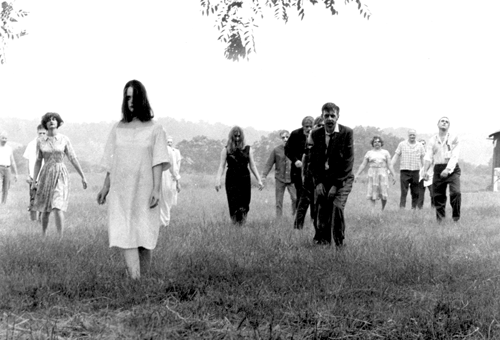 From this, much can be learned about a human future: nihilism frees us from much of our fear by confronting it head-on. Death metal bands have created an epic change in American subculture from one of morality to one of existential self-assertion, but further, the “gore” lyrics of many bands have targeted social denial of collective fear of death.
From this, much can be learned about a human future: nihilism frees us from much of our fear by confronting it head-on. Death metal bands have created an epic change in American subculture from one of morality to one of existential self-assertion, but further, the “gore” lyrics of many bands have targeted social denial of collective fear of death.
Ideology serves an important place in the generation of lyrics and concept to each band. for most, the personal is political in choice of music, intellectual aspirations within it, and values as expressed in themes of darkness, death, the occult, war, genocide and suffering. Death metal reflects a lineage to hardcore music, yet its heavy metal side shows in the use of the personal rather than collective as a means of communication.
That death metal has not collapsed on its own inertia, or become morality-driven and thus socially conformist like emocore or “life metal” bands, is a small miracle in a time of overwhelming commercial motivation to human efforts. Its underground remains strong and defiantly independent. As more people in society feel the need to withdraw from decaying mainstream values and behaviors, death metal’s ideology offers a glimpse of a nihilistic but impressively un-neurotic future.
References:
The Philosophical Tradition of Heavy Metal
Written by Vijay Prozak
2 CommentsTags: zine-zines
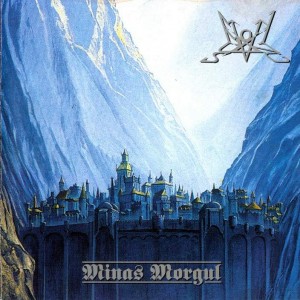
Great Death Metal, through its boundless courage, developed an uncanny ability to plunge listeners into a subterranean labyrinth, revealing the philosophical impetus that stimulated the development of the genre itself. Black metal is slightly inverted, wherein the meandering melodic and thematic developments reveal an adventurous spirit and a desire to plunge into and discover the majesty of the infinite. Indeed, although each genre is somewhat complimentary there is a stark philosophical difference that characterizes each, where Death Metal revels amongst the catacombs and forces listeners to re-evaluate life in the face of their impending doom, Black Metal having stared long enough into the abyss and having emerged from the catacombs seeks glory amongst the stars, and in so doing provides listeners with a glimpse into what once was, and must be again.
Minas Morgul is a testament to this very spirit. Individually meandering, soaring and delicate melodic phrases weave around one another, periodically converging and thus creating a breathtakingly lucid and organically familiar polyphonic structure. What the listener will find most striking is the way each melodic motif develops according to its own internal logic while simultaneously complimenting and augmenting the presentation and development of concurrent melodic lines, which themselves develop according to their own internal logic. Here the infinite abounds as listeners bear witness to the expert use of polyphony, with each rung in the ethereal melodic hierarchy subtly altering the emotional experience of the listener through its capacity for slight differentiation.
The individual melodic motifs themselves are more robust and less restrained than the cryptic sense of melody that characterized say early Darkthrone. However therein lay this albums strength, as each melody is highly communicative and capitalizes on its inherently archaic, although timeless content to appeal those psychological archetypes that define the modern Hessian, to wit, regality, a desire for adventure, wanderlust and a sense for the transcendent.
Guitars are a secondary instrument on this album, however they are utilized with such tact and melodic viciousness, if I may say so, as to ensure that the sometimes airy and sentimental melodies remain grounded, bonded to an orthodox sense of attack and ferality that has always made great metal threatening, challenging, confrontational, and insightful.
Indeed, what makes this album truly compelling is that it successfully melds together a romantic longing for those eternal values that once gave life meaning, with a feral and commanding spirit that wishes to take hold of life and explore it’s depths, and its mountainous heights! One is less likely to find an album more suitable to one’s journey of self exploration and self transcendence.
-TheWaters-
1 CommentTags: Austrian Black Metal, Black Metal, Epic Metal, minas morgul, Summoning, Transcendence
The arch-wizards over at DEATHMETAL.ORG summon forth an article covering the breadth of Finnish underground metal, and cap it off with a hour of music in a compilation of Finnish bands both well-known, and totally unknown.
We are proud to present a sequence of tracks collected by Fenno-American Death Metal connoisseur Benjamin Tianen in tribute to Finland and its strain of artists and conjurers. This compilation of obscure quality Finnish Death Metal is recommended for listening in the twilit hours of day, preferably in rather uninhabited locations as most of Finland is. If there is one teaching one must bring home from Finnish artists and Finnish school of mental exploration, it is that one must not love happiness as much as one loves truth.
Forgotten Death Cults from Finland: an Overview
Includes all the classics: Demigod, Abhorrence, Beherit, Adramelech, Sentenced, Cartilage, Belial, Necropsy, Unholy, Phlegethon, and more.
No Comments